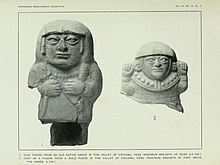Lunar deity

| Part of a series on |
| Anthropology of religion |
|---|
 |
| Social and cultural anthropology |
A lunar deity or moon deity is a deity who represents the Moon, or an aspect of it. These deities can have a variety of functions and traditions depending upon the culture, but they are often related. Lunar deities and Moon worship can be found throughout most of recorded history in various forms.
Moon in religion and mythology
Many cultures have implicitly linked the 29.5-day
Luna, and the Chinese goddess Chang'e. Several goddesses including Artemis, Hecate, and Isis did not originally have lunar aspects, and only acquired them late in antiquity due to syncretism with the de facto Greco-Roman lunar deity Selene/Luna.[2][3]
Male lunar gods are also common, such as
Homeric figure of Menelaus.[citation needed] Cultures with male moon gods often feature sun goddesses and vice versa. In Bakongo religion, the earth and moon goddess Nzambici is the female counterpart of the sun god Nzambi Mpungu.[4] An exception is Hinduism, featuring both male and female aspects of the solar divine. The ancient Egyptians had several moon gods including Khonsu and Thoth, although Thoth is a considerably more complex deity.[5] Set represented the moon in the ancient Egyptian calendar.[6]
Metztli, Coyolxauhqui and Tēcciztēcatl are all lunar deities in the Aztec religion.

Many cultures are oriented chronologically by the Moon, as opposed to the Sun. The
Karwa Chauth, Sankashti Chaturthi, and during eclipses).[7] Ancient Germanic tribes and the peoples they were in contact with, such as the Baltic Finnic peoples, were also known to have a lunar calendar.[8] Calendars such as the Runic calendar fixing the beginning of the year at the first full moon after winter solstice.[9]
The Moon features prominently in
art and literature
, often with a purported influence on human affairs.
See also
References
Wikimedia Commons has media related to Lunar deities.
- ^ Harding, Esther M., 'Woman's Mysteries: Ancient and Modern', London: Rider, 1971, p. 24.
- ISBN 978-0-8070-3253-4.
- ISBN 978-90-04-15420-9.
- ISBN 9780195124569.
- ^ Thoth, the Hermes of Egypt: a study of some aspects of theological thought in ancient Egypt, page 75
- PMID 26679699.
- ISBN 978-0-69112-04-85.
- ^ Hasala, Kasperi (October 2018). "The first workday or the Moon's day? Germanic and Slavic traditions in naming the days of the week in the Finnic languages" (PDF). Studia Uralo-Altaica. 51: 6 – via CORE.
- hdl:11393/259088.

